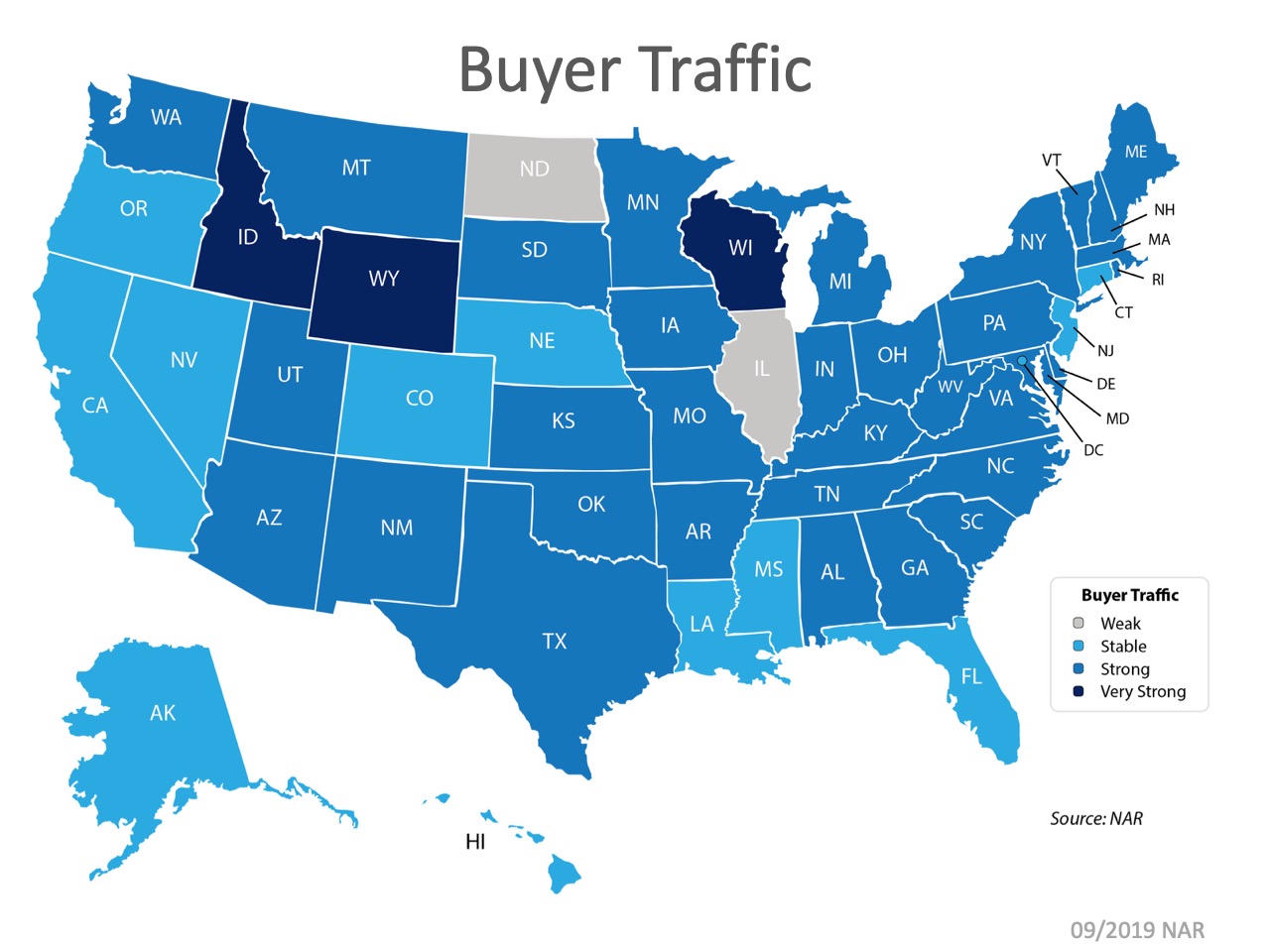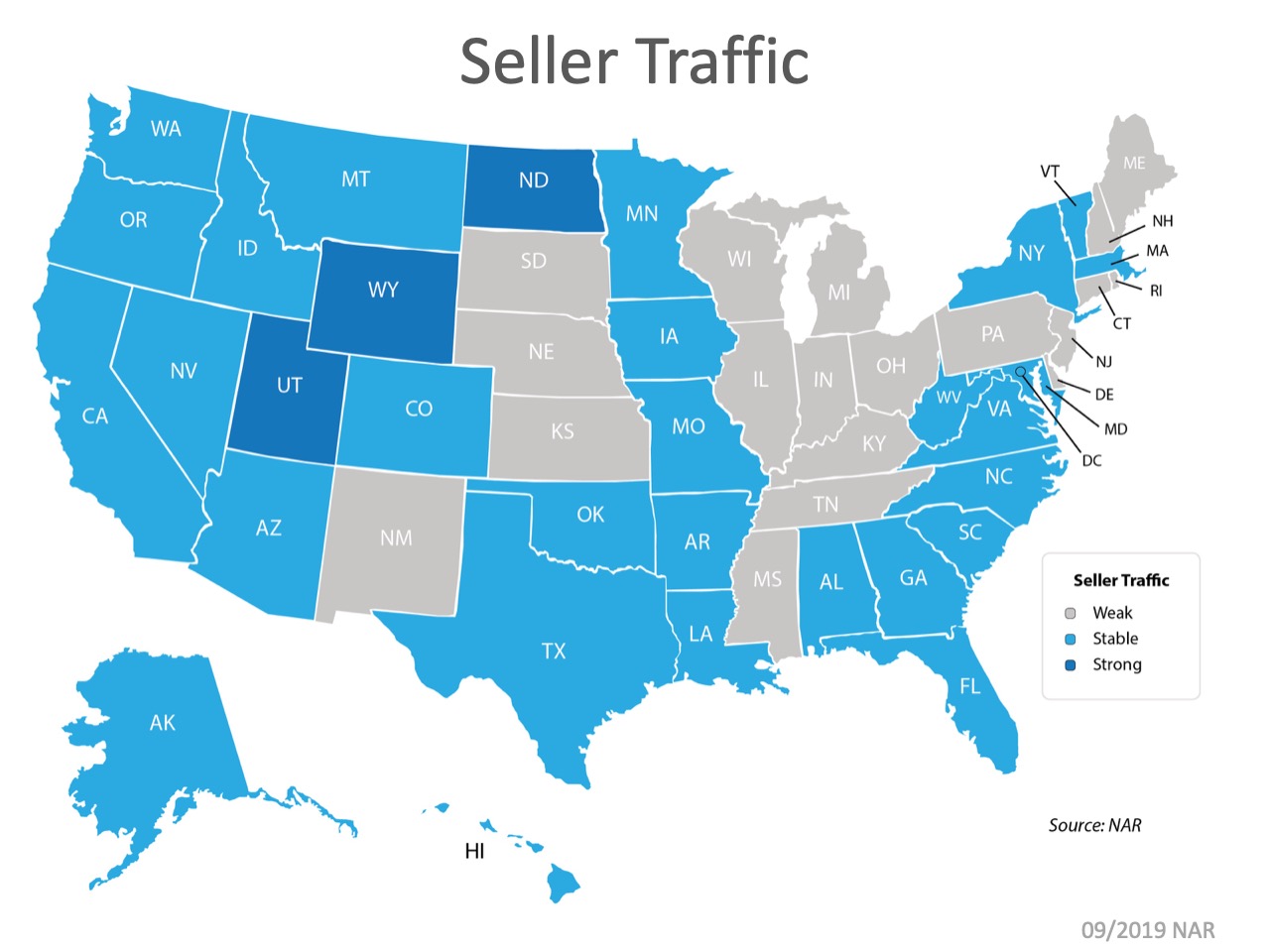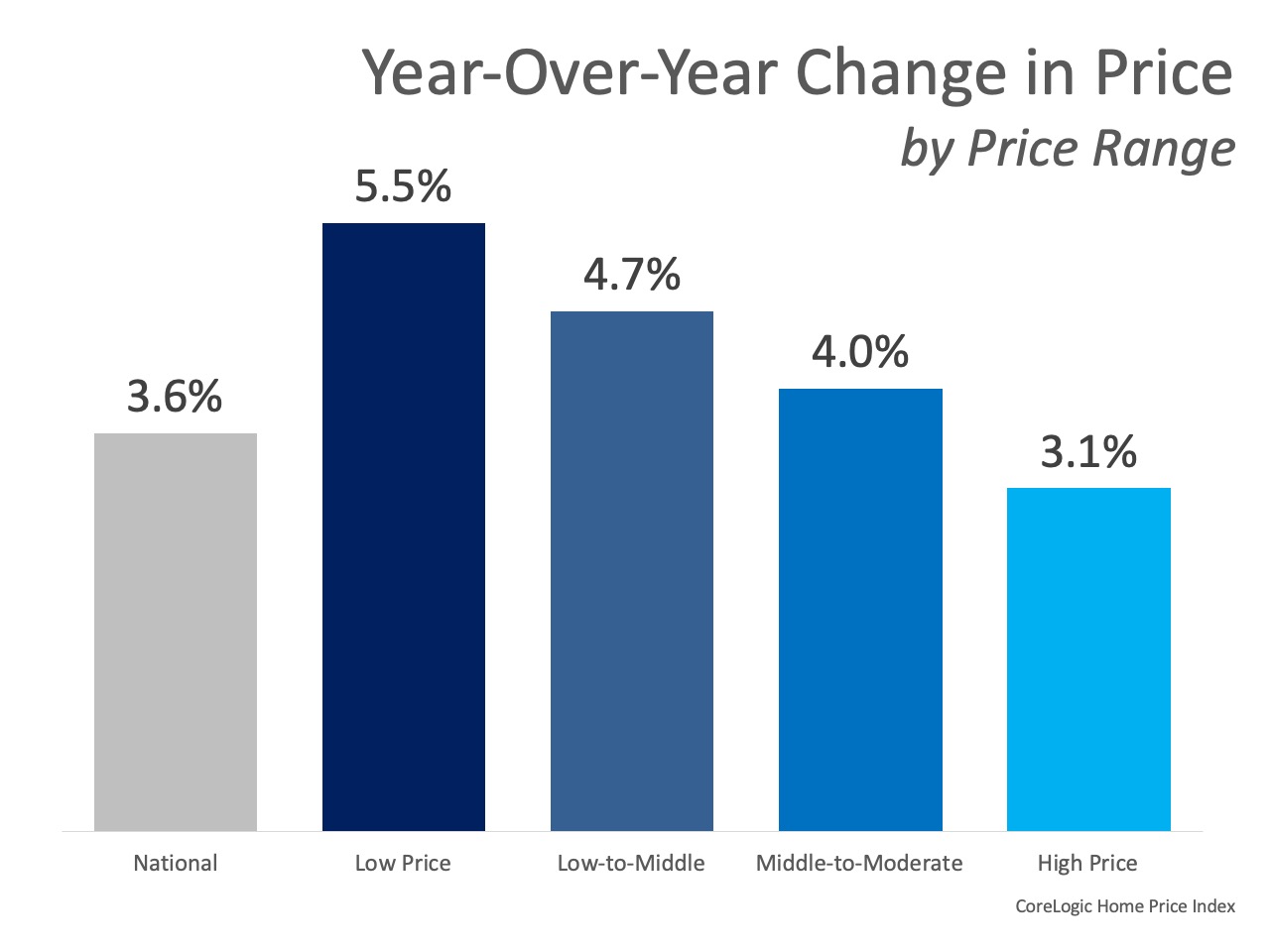3 Signs the Housing Market Is on the Rebound

The residential real estate market has been plodding along for most of the year. However, three recent reports show the market may be on the verge of a rebound:
1. Existing Home Sales (closed sales) are up, marking two consecutive months of growth.
2. Pending Home Sales (contracts signed) are up with each of the four major regions reporting both month-over-month growth and year-over-year gains in contract activity. Here is the month-over-month growth:
- The Northeast rose 0.7%
- The Midwest increased 0.6%
- The South increased 1.4%
- The West grew 3.1%
3. Buyer Traffic (the number of people shopping for a home) is up compared to the same time last year, and for the first time in 13 months.
- The Northeast is up 5.9%
- The Midwest increased 1.3%
- The South is up 2.7%
- The West grew 2.2%
In their most recent report, ShowingTime Chief Analytics Officer, Daniil Cherkasskiy explained:
“The trend we saw in year-over-year buyer traffic in previous months continued across the United States. For all four regions there were more showings per listing this year compared to last year, making it the most competitive August in the last five years.”
Lawrence Yun, Chief Economist with the National Association of Realtors, believes the uptick in activity will continue into the future:
“It is very encouraging that buyers are responding to exceptionally low interest rates…With interest rates expected to remain low, home sales are forecasted to rise in the coming months and into 2020.”
Bottom Line
If you are thinking about selling your house, there are purchasers out there who are ready, willing, and able to buy.
How Does the Supply of Homes for Sale Impact Buyer Demand?
The price of any item is determined by supply, as well as the market’s demand for the item. The National Association of REALTORS (NAR) surveys “over 50,000 real estate practitioners about their expectations for home sales, prices and market conditions” for their monthly REALTORS Confidence Index.
Their latest edition sheds some light on the relationship between seller traffic (supply) and buyer traffic (demand).
Buyer Demand
The map below was created after asking the question: “How would you rate buyer traffic in your area?” The darker the blue, the stronger the demand for homes is in that area. The survey shows that in 3 of the 50 U.S. states, buyer demand is now very strong; only 2 of the 50 states have a ‘weak’ demand. Overall, buyer demand is slightly lower than this time last year but remains strong.
The darker the blue, the stronger the demand for homes is in that area. The survey shows that in 3 of the 50 U.S. states, buyer demand is now very strong; only 2 of the 50 states have a ‘weak’ demand. Overall, buyer demand is slightly lower than this time last year but remains strong.
Seller Supply
The index also asked: “How would you rate seller traffic in your area?” As the map below shows, 18 states reported ‘weak’ seller traffic, 29 states and Washington, D.C. reported ‘stable’ seller traffic, and 3 states reported ‘strong’ seller traffic. This means there are far fewer homes on the market than what is needed to satisfy the buyers who are looking for homes.
As the map below shows, 18 states reported ‘weak’ seller traffic, 29 states and Washington, D.C. reported ‘stable’ seller traffic, and 3 states reported ‘strong’ seller traffic. This means there are far fewer homes on the market than what is needed to satisfy the buyers who are looking for homes.
Bottom Line
Looking at the maps above, it is not hard to see why prices are appreciating in many areas of the country. Until the supply of homes for sale starts to meet buyer demand, prices will continue to increase. If you are debating listing your home for sale, let’s get together to help you capitalize on the demand in our market now.
Homeowners Are Happy! Renters? Not So Much.

When people talk about homeownership and the American Dream, much of the conversation revolves around the financial benefits of owning a home. However, two recent studies show that the non-financial benefits might be even more valuable.
In a recent survey, Bank of America asked homeowners: “Does owning a home make you happier than renting?” 93% of the respondents answered yes, while only 7% said no. The survey also revealed:
- More than 80% said they wouldn’t go back to renting
- 88% agreed that buying a home is the “best decision they have ever made”
- 79% believed owning a home has changed them for the better
Those surveyed talked about the “emotional equity” that is built through homeownership. The study says more than half of current homeowners define a home as a place to make memories, compared to 42% who view a home as a financial investment. Besides building wealth, the survey also showed that homeownership enhances quality of life:
- 67% of current homeowners believed their relationships with family and loved ones have changed for the better since they bought a home
- 78% are satisfied with the quality of their social life
- 82% of homeowners said they were satisfied with the amount of time they spend on their hobbies and passions since purchasing a home
- 75% of homeowners pursued new hobbies after buying a home
Homeowners seem to be very happy.
Renters Tell a Different Story…
According to the latest Zillow Housing Aspirations Report, 45% of renters regret renting rather than buying — more than five times the share of homeowners (8%) who regret buying instead of renting. Here are the four major reasons people regret renting, according to the report:
- 52% regret not being able to build equity
- 52% regret not being able to customize or improve their rentals
- 50% regret that the rent is so high
- 49% regret that they lack private outdoor space
These two studies prove that renting is just not the same as owning.
Bottom Line
There are both financial and non-financial benefits to homeownership. As good as the “financial equity” is, it doesn’t compare to the “emotional equity” gained through owning your own home.
4 Reasons to Sell This Fall
Some Highlights:
- Buyers are active in the market and often competing with one another for available listings.
- Housing inventory is still under the 6-month supply found in a normal housing market.
- Homes are still selling relatively quickly, averaging 31 days on the market.
Home Prices Increase in Every Price Range

CoreLogic’s Home Price Index (HPI) Report revealed,
“National home prices increased 3.6% year over year in July 2019 and are forecast to increase 5.4% from July 2019 to July 2020.”
They also analyzed four individual home-price tiers, showing the increase in each.
Here’s the breakdown:
 To clarify the methodology, CoreLogic explains,
To clarify the methodology, CoreLogic explains,
“The four price tiers are based on the median sale price and are as follows: homes priced at 75% or less of the median (low price), homes priced between 75% and 100% of the median (low-to-middle price), homes priced between 100% and 125% of the median (middle-to-moderate price) and homes priced greater than 125% of the median (high price).”
What does this mean if you’re selling?
Price appreciation can differ depending on your price range. If you’re a homeowner thinking of selling, let’s get together to find out how much your home is increasing in value, so you can price it competitively for today’s market.
What Buyers Need to Know About HOAs

When searching for a home, you may end up selecting a property in a community with a Homeowners Association (HOA). Before you buy, it’s important to know how an HOA works and what they mean for you.
According to a recent article on realtor.com,
“In a nutshell, an HOA helps ensure that your community looks its best and functions smoothly…The number of Americans living in homes with HOAs is on the rise, growing from a mere 1% in 1970 to 25% today, according to the Foundation for Community Association Research.”
An HOA is governed by a board nominated by those living in the neighborhood. It is designed to make sure the residents have a support structure to maintain the value of the community while abiding by a set of guidelines called Common Restrictive Covenants (CC&R),
“Simply put, CC&Rs are just the rules you’ll have to follow if you live in that community. Unlike zoning regulations, which are government-imposed requirements on how land can be used, restrictive covenants are established by HOAs to maintain the attractiveness and value of the property.”
It’s important for homeowners to understand that each HOA is a little different, and they usually have monthly or quarterly fees required for homeowners. These fees can vary based on property size, number of residents, amenities, and more. There may be additional fees charged to homeowners if the reserve fund for the HOA cannot cover a major or unexpected cost, like severe storm damage.
The fees, however, also help maintain common areas such as swimming pools, tennis courts, elevators (for high-rise buildings), and regular wear and tear. Although they are an added cost to the homeowner, an HOA can be a major benefit when it comes to maintaining the value of your neighborhood and your property.
The same article continues to say,
“After your offer to buy a home is accepted, you are legally entitled to receive and review the community’s CC&Rs over a certain number of days (typically between three and 10)…If you spot anything in the restrictive covenants you absolutely can’t live with, you can bring it up with the HOA board or just back out of your contract completely (and keep your deposit).”
Most lenders will factor your HOA fees into your loan package, ensuring the amount of the loan is appropriate for what you can truly afford.
There are some great benefits to having an HOA oversee your neighborhood, and it’s important to understand what fees, structures, and regulations will come into play if there is an HOA where you’d like to live.
Bottom Line
When you’re looking at a potential property to buy, let’s get together so you have a professional who can help you understand the neighborhood’s HOA structure and fees. This way, you’ll feel confident and fully informed when buying a home.
Things to Avoid After Applying for a Mortgage

Congratulations! You’ve found a home to buy and have applied for a mortgage! You’re undoubtedly excited about the opportunity to decorate your new home, but before you make any large purchases, move your money around, or make any big-time life changes, consult your loan officer – someone who will be able to tell you how your decisions will impact your home loan.
Below is a list of Things You Shouldn’t Do After Applying for a Mortgage. Some may seem obvious, but some may not.
1. Don’t Change Jobs or the Way You Are Paid at Your Job. Your loan officer must be able to track the source and amount of your annual income. If possible, you’ll want to avoid changing from salary to commission or becoming self-employed during this time as well.
2. Don’t Deposit Cash into Your Bank Accounts. Lenders need to source your money, and cash is not really traceable. Before you deposit any amount of cash into your accounts, discuss the proper way to document your transactions with your loan officer.
3. Don’t Make Any Large Purchases Like a New Car or Furniture for Your New Home. New debt comes with it, including new monthly obligations. New obligations create new qualifications. People with new debt have higher debt to income ratios…higher ratios make for riskier loans…and sometimes qualified borrowers no longer qualify.
4. Don’t Co-Sign Other Loans for Anyone. When you co-sign, you are obligated. As we mentioned, with that obligation comes higher ratios as well. Even if you swear you will not be the one making the payments, your lender will have to count the payments against you.
5. Don’t Change Bank Accounts. Remember, lenders need to source and track assets. That task is significantly easier when there is consistency among your accounts. Before you even transfer any money, talk to your loan officer.
6. Don’t Apply for New Credit. It doesn’t matter whether it’s a new credit card or a new car. When you have your credit report run by organizations in multiple financial channels (mortgage, credit card, auto, etc.), your FICO® score will be affected. Lower credit scores can determine your interest rate and maybe even your eligibility for approval.
7. Don’t Close Any Credit Accounts. Many clients erroneously believe that having less available credit makes them less risky and more likely to be approved. Wrong. A major component of your score is your length and depth of credit history (as opposed to just your payment history) and your total usage of credit as a percentage of available credit. Closing accounts has a negative impact on both of those determinants in your score.
Bottom Line
Any blip in income, assets, or credit should be reviewed and executed in a way that ensures your home loan can still be approved. The best advice is to fully disclose and discuss your plans with your loan officer before you do anything financial in nature. They are there to guide you through the process.
5 Reasons to Sell This Fall

Below are 5 compelling reasons listing your home for sale this fall makes sense.
1. Demand Is Strong
The latest Buyer Traffic Report from the National Association of Realtors (NAR) shows that buyer demand remains strong throughout the vast majority of the country. These buyers are ready, willing, and able to purchase…and are in the market right now. More often than not, in many areas of the country, multiple buyers are competing with each other to buy the same home.
Take advantage of the buyer activity currently in the market.
2. There Is Less Competition Now
Housing inventory is still under the 6-month supply that is needed for a normal market. This means that in the majority of the country, there are not enough homes for sale to satisfy the number of buyers.
Historically, a homeowner would stay an average of six years in his or her home. Since 2011, that number has hovered between nine and ten years. There is a pent-up desire for many homeowners to move as they were unable to sell over the last few years due to a negative equity situation. As home values continue to appreciate, more and more homeowners will be given the freedom to move.
Many homeowners were reluctant to list their homes over the last couple years, for fear that they would not find a home to move to. That is all changing now as more homes come to market at the higher end. The choices buyers have will continue to increase. Don’t wait until additional inventory comes to market before you decide to sell.
3. The Process Will Be Quicker
Today’s competitive environment has forced buyers to do all they can to stand out from the crowd, including getting pre-approved for their mortgage financing. This makes the entire selling process much faster and simpler, as buyers know exactly what they can afford before shopping for a home. According to Ellie Mae’s latest Origination Insights Report, the time needed to close a loan is 43 days.
4. There Will Never Be a Better Time to Move Up
If your next move will be into a premium or luxury home, now is the time to move up. There is currently ample inventory for sale at higher price ranges. This means if you’re planning on selling a starter or trade-up home and moving into your dream home, you’ll be able to do that in the luxury or premium market.
According to CoreLogic, prices are projected to appreciate by 5.2% over the next year. If you’re moving to a higher-priced home, it will wind up costing you more in raw dollars (both in down payment and mortgage) if you wait.
5. It’s Time to Move on with Your Life
Look at the reason you decided to sell in the first place and determine whether it is worth waiting. Is money more important than being with family? Is money more important than having the freedom to go on with your life the way you think you should?
Only you know the answers to these questions. You have the power to take control of the situation by putting your home on the market. Perhaps the time has come for you and your family to move on and start living the life you desire.
That is what is truly important.
Everybody Calm Down! This Is NOT 2008

Last week realtor.com released the results of a survey that produced three major revelations:
- 53% of home purchasers (first-time and repeat buyers) currently in the market believe a recession will occur this year or next.
- 57% believe the next recession will be as bad or worse than 2008.
- 55% said they would cancel plans to move if a recession occurred.
Since we are currently experiencing the longest-ever economic expansion in American history, there is reason to believe a recession could occur in the not-too-distant future. And, it does make sense that buyers and sellers remember the horrors of 2008 when they hear the word “recession.”
Ali Wolf, Director of Economic Research at the real estate consulting firm Meyers Research, addressed this point in a recent interview:
“With people having PTSD from the last time, they’re still afraid of buying at the wrong time.”
Most experts, however, believe if there is a recession, it will not resemble 2008. This housing market is in no way the same as it was just over a decade ago.
Zillow Economist, Jeff Tucker, explained the difference in a recent article, Recessions Typically Have Limited Effect on the Housing Market:
“As we look ahead to the next recession, it’s important to recognize how unusual the conditions were that caused the last one, and what’s different about the housing market today. Rather than abundant homes, we have a shortage of new home supply. Rather than risky borrowers taking on adjustable-rate mortgages, we have buyers with sterling credit scores taking out predictable 30-year fixed-rate mortgages. The housing market is simply much less risky than it was 15 years ago.”
George Ratiu, Senior Economist at realtor.com, also weighed in on the subject:
“This is going to be a much shorter recession than the last one, I don’t think the next recession will be a repeat of 2008…The housing market is in a better position.”
In the past 23 years, there have been two national recessions – the dot-com crash in 2001 and the Great Recession in 2008. It is true that home values fell 19.7% during the 2008 recession, which was caused by a mortgage meltdown that heavily impacted the housing market. However, while stock prices fell almost 25% in 2001, home values appreciated 6.6%. The triggers of the next recession will more closely mirror those from 2001 – not those from 2008.
Bottom Line
No one can accurately predict when the next recession will occur, but expecting one could possibly take place in the next 18-24 months is understandable. It is, however, important to realize that the impact of a recession on the housing market will in no way resemble 2008.



![4 Reasons to Sell This Fall [INFOGRAPHIC] | MyKCM](https://files.mykcm.com/2019/09/19104136/20190920-MEM-1046x808.jpg)